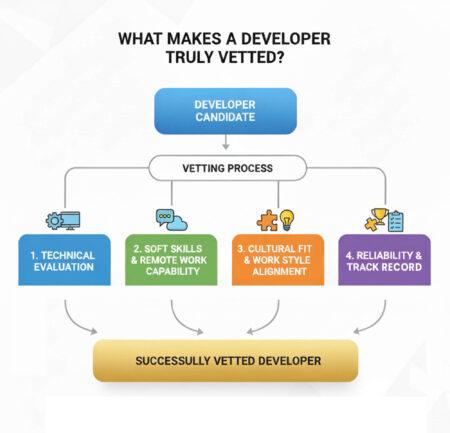Why “Vetted Developers” Is More Than Just a Buzzword in Modern Hiring
The buzz was electric. A promising startup, riding a wave of investor enthusiasm, rushed to launch its ambitious new platform. Developers were hired in a flurry, prioritizing speed over scrutiny. Resumes looked great, and interviews were quick. But just weeks after launch, bugs proliferated, the code base became a tangled mess, and critical features stalled. The “fast” hiring turned into agonizing delays, missed deadlines, and ultimately, a costly rewrite.
This scenario, unfortunately, is not uncommon. In today’s fast-paced tech world, the term “vetted developers“ often gets thrown around, sounding like just another piece of marketing jargon. But for any company serious about product quality, team efficiency, and sustainable growth, particularly when building remote and global teams, “vetted” is far from a buzzword; it’s a strategic imperative.
At its core, a “vetted developer” isn’t just someone with a polished resume. It’s an individual whose technical skills, remote work capabilities, communication style, and cultural alignment have been thoroughly evaluated against real-world demands. It’s about looking beyond the surface to confirm that a developer can not only code but can also collaborate effectively, solve problems autonomously, and contribute positively to your team’s success, especially across borders and time zones.
The Problem with Hiring Without Vetting
The allure of “fast hiring” can be tempting, especially when deadlines loom. However, bypassing a robust vetting process often leads to a cascade of costly problems:
- Mismatched Expectations: A developer might have a skill listed but lack practical experience, leading to misunderstandings about project scope and timelines.
- Poor Code Quality & Technical Debt: Unvetted developers can introduce bugs, inefficient code, or poor architectural decisions, creating technical debt that slows down future development.
- Communication Breakdown: In remote settings, poor communication skills—or a lack of proficiency with collaboration tools—can cause delays, rework, and frustration.
- High Turnover & Low Morale: Developers who aren’t a good fit, either technically or culturally, are more likely to leave, leading to constant churn, burnout for existing team members, and a dip in overall morale.
- Project Delays & Missed Deadlines: Any of the above pitfalls can quickly derail project timelines, costing valuable time and market opportunities.
- Reputational Risk: A subpar product or service, directly linked to inadequate development, can damage your brand and deter customers.
Ultimately, hiring without proper vetting doesn’t save time or money; it simply shifts the cost from recruitment to costly rework, delayed launches, and lost opportunities.
What Makes a Developer Truly Vetted?
A truly vetted developer has gone through a comprehensive evaluation process that scrutinizes multiple facets of their capability:
1. Technical Evaluation: This goes beyond simple coding tests. It includes:
- Live Coding Challenges: Assessing problem-solving skills and coding style under pressure.
- Take-Home Assignments: Evaluating practical application of skills in a more realistic setting.
- Portfolio & Past Project Review: Deep diving into actual work, understanding their contributions and technical decisions.
- Architecture & System Design Discussions: Testing their ability to think at a higher level and contribute to strategic technical decisions.
2. Soft Skills & Remote Work Capability: Crucial for remote teams, this assesses:
- Communication: Clarity in written and verbal communication, active listening.
- Self-Motivation & Autonomy: Ability to work independently, manage time effectively, and take initiative without constant oversight.
- Collaboration: Proficiency with tools like Slack, Jira, GitHub; willingness to engage in code reviews and pair programming.
- Problem-Solving: Beyond just coding, how they approach complex issues and find solutions.
3. Cultural Fit & Work Style Alignment: Understanding if their values and preferred working style align with your company’s ethos. This isn’t about personality matching, but about ensuring synergy.
4. Reliability & Track Record: Verification of past roles, responsibilities, and performance through thorough reference checks.

How Vetted Remote Developer Hiring Enables Speed + Quality
Investing in vetting upfront pays dividends in efficiency and product excellence:
- Quick Hiring & Guaranteed Fit: Developers on platforms like eDev have already passed rigorous technical and soft-skill evaluations. This means clients can quickly shortlist candidates after a final interview, confident that they’re hiring from a pool of proven talent. If a match doesn’t work out, the platform ensures a replacement—giving businesses the freedom to scale up or down as needed while leaving recruitment complexities to the platform.
- Faster Onboarding & Fewer Misunderstandings: Vetted remote developers arrive ready to contribute, understanding remote workflows and requiring less hand-holding.
- Reduced Oversight & Less Rework: Confident in their abilities, managers spend less time micromanaging and more time strategizing. Code quality is higher, minimizing costly bug fixes and refactoring.
- Confidence in Scaling Up: Knowing your team is built on a foundation of proven talent provides the confidence to take on larger, more ambitious projects.
Building a Vetted Hiring Process: Best Practices
Creating an effective vetting process involves several key steps:
- Define Your Needs Clearly: Before you start, articulate the exact technical skills, soft skills, and remote work expectations for the role.
- Multi-Stage Screening:
- Initial Resume/Profile Filter: Focus on experience, tech stack, and evidence of remote work.
- Technical Assignment/Coding Challenge: Assess core technical proficiency relevant to the role.
- Technical & Behavioral Interviews: Evaluate problem-solving, architectural thinking, soft skills, and remote readiness.
- Reference Checks: Validate past performance and work ethic.
- Consider a Trial Task or Probation Period: For critical roles, a short, paid trial project can offer invaluable insight into a candidate’s real-world performance and fit.
- Leverage Tools and Platforms: Utilize specialized coding challenge platforms, portfolio review tools, and communication assessments.
- Establish Feedback Loops: Continuously refine your vetting criteria based on the performance of past hires. What worked? What didn’t?
Global Vetting: Special Considerations
When hiring across borders, the importance of robust vetting is amplified:
- Navigating Time Zones and Cultures: Assess a developer’s experience and adaptability in asynchronous communication and cross-cultural collaboration.
- Ensuring Legal and IP Protections: When hiring globally, particularly for contractors, ensure all contracts protect your intellectual property and comply with local regulations.
- Remote Work Infrastructure: Confirm candidates have reliable internet, a suitable home office setup, and experience with remote tools.
- Amplified Soft Skills: With less face-to-face interaction, clarity, proactivity, and self-organization become even more critical.
Instead of building this complex system yourself, a platform like eDev can manage the entire vetting and hiring process end-to-end—sourcing, technical assessments & interviews, hire on-demand, onboarding, compliance, HR, payroll & benefits, contractor payments, workforce management, performance monitoring, and even replacements if needed, freeing up your valuable time to focus on building the product, not sifting through resumes or managing remote resources.
ROI and Long-Term Benefits of Choosing Vetted Remote Developers
The return on investment for robust vetting is significant:
- Cost Savings: Lower recruitment costs due to reduced turnover, less time spent on rework, and faster project completion.
- Better Product Quality: Higher-skilled developers lead to more robust, scalable, and user-friendly products.
- Faster Releases: Efficient development cycles mean products get to market quicker.
- Stronger Team Morale & Retention: A well-vetted team fosters a positive, productive, and stable work environment, leading to higher retention.
- Scalable Culture: A foundation of high-quality talent makes it easier to expand your team and maintain consistent standards.
- Seamless Remote Collaboration: Developers vetted for remote readiness bring strong communication, self-management, and asynchronous work skills, ensuring smoother collaboration across distributed teams.
- Global Talent Advantage: Accessing a wider pool of pre-vetted remote developers means businesses can scale faster while tapping into diverse skill sets and perspectives not limited by geography.
Final Thoughts
The term “vetted developers” is far from marketing fluff. It represents a strategic commitment to quality, efficiency, and sustainable growth, especially in an era of global and remote teams. Ignoring a thorough vetting process is a gamble that most businesses cannot afford to take, leading to costly mistakes and missed opportunities.
Now is the time for companies to audit their current hiring processes. If your strategy isn’t centered around robust vetting, it’s time to explore how to integrate this critical step.
At eDev, we specialize in solving this challenge. Our platform provides access to a global pool of pre-vetted developers who have undergone rigorous technical, soft skill, and remote work assessments. We offer flexible engagement models ( short-term pay-by-the-hour and EOR) and handle the complexities of global talent acquisition, ensuring you connect with developers who are not just skilled but truly vetted and ready to drive your projects forward. Let us help you build the high-performing teams your ambitious products deserve. Contact us today!





























